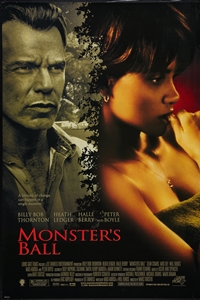Monster's Ball (R) ★★★½
 Monster's Ball is the story of three generations of men: the elderly, racist Buck and his son Hank and grandson Sonny, both of whom work as correctional officers at a federal prison. But prepping inmates for the electric chair has affected their psyche in dramatic and tragic ways.
Monster's Ball is the story of three generations of men: the elderly, racist Buck and his son Hank and grandson Sonny, both of whom work as correctional officers at a federal prison. But prepping inmates for the electric chair has affected their psyche in dramatic and tragic ways.
Story
Hank Grotowski (Billy Bob Thornton) lives with his aging, white-trash father Buck (Peter Boyle), and his twentysomething son Sonny (Heath Ledger) in a backwoods Georgia town. Hank and Sonny are both correctional officers in a state penitentiary that routinely executes prisoners by means of the electric chair. Being more experienced, Hank becomes a mentor to his son, showing him the ins and outs of prepping prisoners on death row and warning his son never to become attached to the inmates. But Sonny becomes deeply affected by the execution of Lawrence Musgrove (Sean Combs), a black man with whom he has bonded. This doesn't sit well with Hank, who believes inmates and guards should have limited contact, and creates tension between father and son. Then, in a bizarre twist of fate, Hank meets and becomes involved with Laticia (Halle Berry), a black waitress at a local diner who, unbeknownst to him, is Musgrove's widow. Their neediness brings them together and although they are both somewhat dysfunctional, their unexpected relationship brings out the best in them and melts away obstacles that may have otherwise kept them apart.
Acting
Hair-raising performances by Thornton and Berry make Monster's Ball believable and engrossing. Thornton's character Hank does some purely evil things, but you never truly despise him because his motives are always questionable. For example, he gets angry with his son for breaking down while walking Musgrove to the electric chair, but we later find out he was upset that Sonny had screwed up ''that man's last walk.'' While he bows to his father's racist iron fist, Thornton always conveys an underlying sense of empathy. Berry's character Laticia is just as complicated. She has a drinking problem and verbally abuses her overweight 11-year-old son, but rather than viewing her as a neglectful human being, Berry brings out Laticia's hopelessness and need to be taken care of. Ledger as Sonny, Hank's son, doesn't seem to have inherited the racist gene. Although he's not as despicable as the rest of his family, he still has a twisted sense of morality. When a prostitute he hires for sex tells him to go easy because she's ''sore,'' he politely replies, ''Yes ma'am.'' Combs plays his small role as the death row inmate convincingly, without being sappy or overly sentimental.
Direction
Monster's Ball could have been good as a simple and straightforward story, but instead achieves greatness by taking unpredictable turns and twists. Berry and Thornton's characters are unreasonable and flawed, but in a real and powerful way. Both are really bad parents to their children and try to make up for it by being good to one another, redeeming themselves in the process and give up things of personal importance for one other. And while their relationship is far from ideal, it works. Racism is the dominant theme in the film, but director Marc Forster chose not to make it much of an issue in Hank and Laticia's relationship, which is based more on dependency than anything else. There is however, prevalent symbolism throughout the film, like the way Hank only eats chocolate ice cream with a white plastic spoon, or paints his dark wood-paneled walls white when Laticia moves in. The film also follows Musgrove's last day with the gritty realism that surrounds state-sanctioned executions, down to the smoke emanating from the hood on his head.
Bottom Line
This film takes a powerful look at two ordinary people and the forces that bring them together without ever feeling drawn out or exploitive. Although the subject matter can be unsettling at times, it always remains disturbingly down to earth.
To get the full Quicklook Films experience, uncheck "Enable on this Site" from Adblock Plus
box office top 10

Civil War Released: April 12, 2024 Cast: Kirsten Dunst, Wagner Moura 25.7M

Godzilla x Kong: The New Empire Released: March 29, 2024 Cast: Rebecca Hall, Brian Tyree Henry 15.5M

Ghostbusters: Frozen Empire Released: March 22, 2024 Cast: Paul Rudd, Carrie Coon 5.8M

Kung Fu Panda 4 Released: March 8, 2024 Cast: Jack Black, Viola Davis 5.5M

Dune: Part Two Released: March 1, 2024 Cast: Timothée Chalamet, Rebecca Ferguson 4.3M

Monkey Man Released: April 5, 2024 Cast: Dev Patel, Sikandar Kher 4.1M

The First Omen Released: April 5, 2024 Cast: Nell Tiger Free, Bill Nighy 3.8M

The Long Game Released: April 12, 2024 Cast: Dennis Quaid, Gillian Vigman 1.4M

Shrek 2 Released: May 19, 2004 Cast: Mike Myers, Eddie Murphy 1.4M

Sting Released: April 12, 2024 Cast: Alyla Browne, Ryan Corr 1.2M






